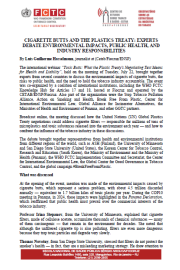
The international webinar “Toxic Butts: What the Plastic Treaty's Negotiating Text Means for Health and Liability”, held on the morning of Tuesday, July 22, brought together experts from several countries to discuss the environmental impacts of cigarette butts, the risks to public health, and the need to hold the tobacco industry accountable. The event was co-organized by a coalition of international institutions, including the WHO FCTC Knowledge Hub for Articles 17 and 18, hosted at Fiocruz and operated by the CETAB/ENSP/Fiocruz. Also part of the organization were the Stop Tobacco Pollution Alliance, Action on Smoking and Health, Break Free From Plastic, Center for International Environmental Law, Global Alliance for Incinerator Alternatives, the Ministries of Health and Environment of Panama, and other GGTC partners.
HASSELMANN, Luis Guilherme. Bitucas de cigarro e o tratado do plástico: especialistas debatem impactos ambientais, saúde pública e responsabilidades da indústria. Cetab/Ensp/Fiocruz, Rio de Janeiro, 23 jul. 2025. 3 p.

Highlights with topics considered to be of importance with the aim of promoting debates and decision-making in the area of tobacco control. In this edition, the agenda covers: two decades of the FCTC and the Current Challenges of Tobacco Control; 20 years of the FCTC: a milestone in the fight against tobacco; Anvisa reinforces commitment to Public Health by canceling visit to cigarette manufacturer; and Tobacco industry seeks repositioning with new leadership.
KORNALEWSKI, Alex Medeiros; CARVALHO, Alexandre Octavio Ribeiro de; BARATA, Danielle; HASSELMANN, Luis Guilherme; TURCI, Silvana Rubano. Destaques do Observatório sobre as Estratégias da Indústria do Tabaco. Cetab/Ensp/Fiocruz, Rio de Janeiro, julho, 2024. Acesso em: 2 abr. 2025.

Página eletrônica da indústria de tabaco Philip Morris Brasil sobre Alternativas ao cigarro à combustão. Você sabia que existem opções ao cigarro tradicional? Hoje em dia é possível encontrar alternativas potencialmente menos tóxicas do que aquelas à combustão*. Uma nova escolha para adultos fumantes que não pretendem parar de fumar.
PHILIP MORRIS. Quero escolher [página eletrônica]. [s.l.], 2025. Disponível em: https://queroescolher.com/. Acesso em: 31 mar. 2025.

Document listing the TOP 10 actions for tobacco control.

Document listing the TOP 10 tobacco industry interference.
“TOP 10” Estratégias da Indústria do Tabaco no Brasil em 2024. Cetab/Ensp/Fiocruz, Rio de Janeiro, 6 fev. 2025.

Highlights with topics considered to be of note with the aim of promoting debates and decision-making in the area of tobacco control. In this edition, the agenda covers: regulatory challenges of tobacco control in Brazil; the event discusses tobacco industry tactics and parallels with the regulation of the use of digital devices; Cetab and DAENT discuss the need to update alcohol control policies in Brazil and the constitutionality of the regulation of additives in tobacco products by ANVISA: Impact of the Judgment in the STF.
KORNALEWSKI, Alex Medeiros; CARVALHO, Alexandre Octavio Ribeiro de; BARATA, Danielle; HASSELMANN, Luis Guilherme; TURCI, Silvana Rubano. Destaques do Observatório sobre as Estratégias da Indústria do Tabaco. Cetab/Ensp/Fiocruz, Rio de Janeiro, julho, 2024. Acesso em: 13 nov. 2024.
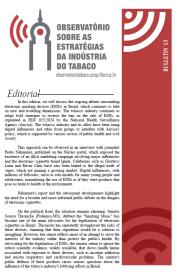
Bulletin thirteen published by the Center for Studies on Tobacco and Health of the Sergio Arouca National School of Public Health of the Oswaldo Cruz Foundation (Cetab/Ensp/Fiocruz). This edition is composed of: editorial; Tax reform and the interests of the tobacco industry: a critical look; Investigating the veiled promotion of vapes: an interview with Pedro Nakamura; Profile of Senator Soraya Thronicke: the "Muse of Smoking" and her lobby for the legalization of electronic smoking devices; and PAHO updates the strategic action plan to strengthen tobacco control in the Americas region 2025-2030.
A REFORMA tributária e os Interesses da Indústria do tabaco: um olhar crítico [boletim TREZE]. Cetab/Ensp/Fiocruz, Rio de Janeiro, n. 13, 21 out. 2024.
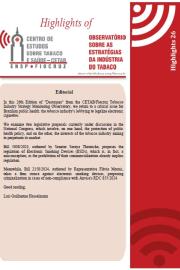
Highlights with topics considered to be of importance with the aim of promoting debates and decision-making in the area of tobacco control. In this edition, the agenda covers: Electronic Cigarettes and Public Health: A Critical Analysis of Legislative Proposals PL 5008/2023 and PL 2158/2024 and Tobacco Industry Strategies to Promote DEF.
KORNALEWSKI, Alex Medeiros; CARVALHO, Alexandre Octavio Ribeiro de; BARATA, Danielle; HASSELMANN, Luis Guilherme; TURCI, Silvana Rubano. Destaques do Observatório sobre as Estratégias da Indústria do Tabaco. Cetab/Ensp/Fiocruz, Rio de Janeiro, julho, 2024. Acesso em: 28 ago. 2024.
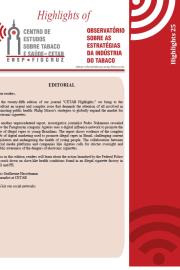
Highlights with topics considered important with the aim of promoting debates and decision-making in the field of tobacco control. In this edition, the agenda is about: Studies Reveal Philip Morris Strategies to expand the electronic cigarette market, the digital influence of vapers, Agatres' tactics, disguised advertising and controversial partnerships.
KORNALEWSKI, Alex Medeiros; CARVALHO, Alexandre Octavio Ribeiro de; BARATA, Danielle; HASSELMANN, Luis Guilherme; TURCI, Silvana Rubano. Destaques do Observatório sobre as Estratégias da Indústria do Tabaco. Cetab/Ensp/Fiocruz, Rio de Janeiro, julho, 2024. Acesso em: 16 julho 2024.
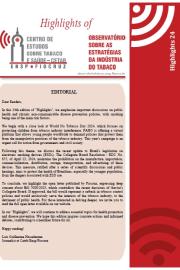
Highlights with topics considered important with the aim of promoting debates and decision-making in the field of tobacco control. In this edition, the agenda is about: updating legislation on electronic smoking devices (DEF) in Brazil. The Resolution of the Collegiate Board - RDC No. 855, of April 23, 2024, maintains the prohibition of manufacturing, importing, selling, distributing, storing, transporting and advertising these devices and other news about interference by the tobacco industry.
KORNALEWSKI, Alex Medeiros; CARVALHO, Alexandre Octavio Ribeiro de; BARATA, Danielle; HASSELMANN, Luis Guilherme; TURCI, Silvana Rubano. Destaques do Observatório sobre as Estratégias da Indústria do Tabaco. Cetab/Ensp/Fiocruz, Rio de Janeiro, maio, 2024. Acesso em: 29 maio 2024.